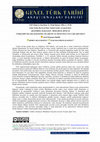Papers by Ayşe HACİMUSTAFAOĞLU

Turkic peoples have interacted with many religions and belief systems as they frequently change p... more Turkic peoples have interacted with many religions and belief systems as they frequently change places due to their lifestyles. In this context, although Turks were attached to belief systems such as Buddhism, Manichaeism and Totemism before Islam, the understanding of one God, which is evident in the Turkish belief system, facilitated their adaptation to a heavenly religion. Although monotheistic religions such as Judaism and Christianity found a limited base among Turks, it cannot be compared with the influence of Islam. Especially in the 9th and 10th centuries, Islam, which started to spread rapidly among the Turks, gained a wide mass base with economic and cultural interactions apart from military and political activities. This landscape, which can be easily discerned through the records of Muslim travelers and chroniclers of the age, indicates that the mutually beneficial relationship between Turks and Muslim merchants, which started with economic orientations, soon turned into a cultural exchange. The religion of Islam, which tends to spread primarily through military conquests in the Turkish geography, has gained remarkable momentum with the introduction of non-political means of dissemination and in this way, it has reached a wide area. At this point, the guidance activities carried out by merchants in Turkish cities and by dervishes in rural areas, especially among nomadic Turks, made it easier for this new religion to find a base among Turkish communities and to eliminate prejudices about Islam. Muslim merchants who established trade colonies in the Caspian, Bulgarian, Khwarezm, Khorasan, Turkestan and even Chinese countries attracted the attention of the people of the region with their lifestyle, clothing and worship and merchants played a functional role in the adoption of Islam and its principles by the Turkish people, which they explained through peaceful means. Thus, trade and notification were intertwined in the geographical areas where Turks dominated or settled; The internal spiritual conquests of Muslim merchants significantly reinforced the external political conquests of the armies. It is clear from the information given in the sources that the Muslim traders who spread to the Far East from the early times, regardless of political developments, carried not only commercial products, but also their beliefs and cultures. Islam flourished and took root in the region thanks to the seeds planted by merchants in regions such as Khorasan, Bukhara and Samarkand during the transition period. Thus, Muslim traders freely entering and leaving Turkish countries, on the one hand, ensured the exchange and circulation of products, on the other hand, they became voluntary intermediaries of the religious and cultural exchange between the Turks and the Islamic world and they have played important roles in the transmission of belief and culture, regardless of political developments. This positive interaction in the commercial field led to the introduction of Islam, which shaped the character of these people in a very short time in the north of the Black Sea, Transoxiana, Khorasan and other cities where Turks live in large numbers. In this article, the preaching and guidance activities among the Turkish tribes of the Muslim traders who are active on the trade route from the Turkish geography will be explained. In addition, the effect of these activities on the mass conversion of the Turks to Islam will be discussed.











Uploads
Papers by Ayşe HACİMUSTAFAOĞLU